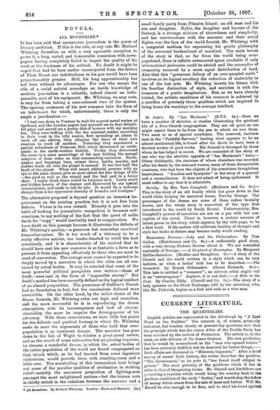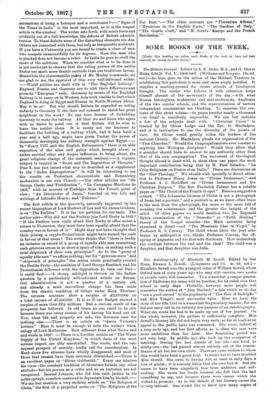CURRENT LITERATUR E.
THE QUARTERLIES.
English politics are represented in the Edinburgh by "A Last Word on the Peelites." The interest is, of course, primarily historical, but touches closely on present-day questions now that the principle which was the raison d'être of the Peelite Party has been attacked by the revival of Protection. The article is, in the main, an able defence of Sir James Graham. His own prediction that he would be remembered as the " man who opened letters " has been curiously fulfilled, but he deserved far better things.— Irish affairs are discussed in "Hibernia Impacata." After a brief survey of recent Irish history, the writer describes the position. "The Government," as he puts it, "has found itself obliged to govern." The most pressing of the problems which it has to solve is that of the grazing farms. Mr. Ginnell and his fellows are promoting a reaction which would bring the country back to the perilous condition of the early " forties," and would stop the inflow of money which comes from the sale of meat and butter. Will Mr. Birrell be wise enough to be firm, and to steel his heart against accusations of being a betrayer and a coercionist ?—" Signs of the Times in India" is the most important, as it is the longest article in the number. The writer sets forth, with much force and evidently out of a full knowledge, the defects of British adminis- tration. To these defects some of the disturbing elements are due. Others are connected with them, but only as inseparable accidents. If you have a University you are bound to create a class of men who compete unsuccessfully for its degrees. Here the man who is plucked does not become a rebel. In India he goes to swell the ranks of the seditious. When we consider what is to be done it is not irrelevant to observe that the ruling powers of the native States use much more drastic methods than our traditions favour. Meanwhile the statesmanlike policy of Mr. Morley commands, wo are glad to see, the approval of this very well-informed writer. —World polities are dealt with in "The Baghdad Railway." England, France, and Germany are to sink their differences and promote "European " ends. Germany by means of the Baghdad Railway is to carry on in Western Asia work similar to that which England is doing in Egypt-and France in North-Western Africa. May it be so ! But why should Britain be regarded as acting unfairly to Germany if she does not consent to assist her great neighbour in the work? No one here dreams of forbidding Germany to make the railway. All that we and those who agree with us desire to point out is that Britain will be wise to leave the matter alone. It is surely not our business to facilitate the building of a railway which, had it been built a year and a half ago, might have given Turkey the power of immensely developing her military strength against Egypt.— In "Henry VIII. and the English Reformation" there is an able exposition of the aims and policy which brought about, or rather assisted other and deeper influences to bring about, the great religious change of the sixteenth century.-1 cognate subject is treated in "Rome and the Repression of Thought." Pius X. has just issued what may be described as a supplement to the "Index Expurgatorius." It will be interesting to see the results on Protestant obscurantists and Romanising modernists in our own Church.—The other articles are " Sir George Clarke and Fortification" ; " La Campagne Maritime de 1805," with an account of Trafalgar from the French point of view ; " An Interpreter of Japan," founded on the Life and writings of Lafcadio Hearn ; and "Palermo."
The first article in the Quarterly, naturally suggested by the recent biographies of Lord Herbert of Lea and Sir James Graham, is on " The Peelites." It is far too partisan for our taste. The author asks—Why did not the Peelites join Lord Derby in 1852 ? " If the Peelites were really afraid that Derby in office meant a return to Protection, they must have been equally afraid that the country was in favour of it." Might they not have thought that their joining a crypto-Protectionist might have turned the scale in favour of that cause ? The writer thinks that " there is hardly an instance on record of a group of equally able men committing such grievous errors in so short a space of time, or making such a total shipwreck of their own principles." .As to the " group of equally able men " we affirm nothing; but for " grievous error" and " shipwreck of principles " the action which practically created the Peelite Party—the coalition of Lord George Bentinck and his Protectionist followers with the Opposition to turn out Peel— is easily first.—A. strong sidelight is thrown on the Indian question by a particularly well-informed article on Burma. Our administration is not a quarter of a century old, and already a most marvellous change has been made from the chaotic condition of things under King Theebaw. The revenue accounts show a surplus of 42,670,000 on a total income of £7,200,000. It is as if our Budget showed a surplus of more than fifty millions. But a curious result of the prosperity has followed. In old times no one cared to be rich because there was every chance of his having his head cut off. Now, when life and property are safe, the Burmese care for nothing else.—There is an article on "Queen Victoria's Letters." Here it must be enough to note the writer's warm eulogy of Lord Melbourne. How different from what Tories said and wrote in 1838 ! —There is a forcible article on " The Water Supply of the United Kingdom," in which facts of the most serious import are ably marshalled. The waste, and the con- sequent prospect of scarcity, loudly call for consideration. In Kent alone five streams have wholly disappeared, and most of those that remain have been seriously diminished.—There is an excellent paper on "Oliver Goldsmith." Every one admires his verse—the constant tradition of literature forbids any other attitude—but his powers as a critic and as an historian are not recognised. Samuel Johnson, who did him such justice in his noble epitaph, somehow contrived to depreciate him by his talk.— We can but mention a very striking article on "The Religion of China," the first of a projected series on "The Religions of the
Far East."—The other contents are "Florentine Athens," " Mysticism in the English Poets," " The Gardens of Italy," " The Gentle Craft," and " M. Sorel's Europe and the Frenoh Revolution:"











































 Previous page
Previous page